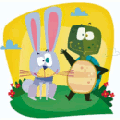235 - La tortuga y la liebre
|Schildkröte|||Hase
||||hare
235 - Die Schildkröte und der Hase
235 - The Tortoise and the Hare
235 - 거북이와 토끼
235 - Vėžlys ir kiškis
235 - A tartaruga e a lebre
235 - Черепаха и заяц
NARRADOR Una tortuga y una liebre siempre discutían sobre quién era más rápida.
|||||Hase||diskutierten||wer|||schnell
|||||hare||were arguing|||||
NARRATOR A tortoise and a hare always argued about who was faster.
LIEBRE ¡Yo!
TORTUGA ¡Yo!
NARRADOR Para resolver la discusión, decidieron hacer una carrera.
||||||||Rennen
NARRATOR To settle the argument, they decided to have a race.
La liebre salió a toda velocidad … y corrió enérgicamente durante algún tiempo.
||||||||energisch|||
|hare|left||||||energetically|||
The hare sped off…and ran briskly for some time.
LIEBRE Llevo mucha ventaja... Mejor me siento a descansar un rato debajo de aquel árbol...
|||Vorteil|||||ausruhen||||||
|I||advantage|||||to rest|a||||that|
HARE I have a lot of advantage ... I'd better sit down to rest for a while under that tree ...
NARRADOR Pero se quedó dormida.
NARRATOR But she fell asleep.
NARRADOR La tortuga, a paso lento, alcanzó a la liebre dormilona, la superó y llegó primera a la meta.
||||||||||schlafende||überholte||||||Ziel
|||||slow|caught up to|||hare|sleepy|the|surpassed||||at||finish
NARRATOR The tortoise, at a slow pace, caught up with the sleepy hare, overtook it and reached the finish line first.
NARRADOR Moraleja: los lentos pero constantes ganan la carrera.
|Moraleja||||beständigen|gewinnen||
|||||constant|||race
NARRATOR Moral: The slow but steady win the race.
NARRADOR Pero la historia no termina aquí.
|||||endet|hier
La liebre, decepcionada por su derrota, reconoció sus errores.
|Hase|enttäuscht|||Niederlage|erkannte||
||disappointed|||defeat|||
LIEBRE Fui presumida y descuidada... Me confié de mi ventaja...
||eitel||nachlässig||vertraute|||
||conceited||careless|I|I trusted|||advantage
HARE I was presumptuous and careless... I relied on my advantage...
NARRADOR Entonces, desafió a la tortuga a una nueva competencia.
||fordern|||||||
||he challenged|||||||
NARRADOR Esta vez, la liebre corrió de principio a fin y su triunfo fue evidente.
||||||||||||Triumph||evident
NARRATOR This time, the hare ran from start to finish and his triumph was evident.
NARRADOR Moraleja: los rápidos y tenaces vencen a los lentos y constantes.
|||||beharrlichen|besiegen|||||
|||fast||tenacious|win|||||constant
NARRATOR Moral: The fast and tenacious beat the slow and steady.
NARRADOR Pero la historia tampoco termina aquí.
NARRATOR||||||
Tras ser derrotada, la tortuga reflexionó...
nach||derotiert|||reflektierte
After|being|defeated|||reflected
After being defeated, the turtle reflected...
TORTUGA En velocidad nunca podré ganarle a la liebre.
|||||schlagen|||
|||||to beat|||
Pero... ¡tengo una idea!
NARRADOR La tortuga desafió nuevamente a la liebre, pero cambiando de ruta.
|||||||||wechselnd||Route
|||challenge||||hare||changing||route
La liebre aceptó y corrió a toda velocidad, hasta que un ancho río se cruzó en su camino.
|||||||||||breiter||||||
||||||||||a|wide||||||
The hare accepted and ran at full speed, until a wide river crossed his path.
LIEBRE Y ahora, ¿qué hago?
||||do
Yo no sé nadar.
|||swim
TORTUGA Pues yo sí.
|Well||
TORTOISE Well I do.
NARRADOR La tortuga nadó hasta la otra orilla, continuó a su paso y terminó en primer lugar.
|||schwamm||||Ufer||||||beendete|||
|||swam||||shore|||||||||
NARRATOR The turtle swam to the other shore, followed in its wake and finished first.
NARRADOR Moraleja: Quienes identifican su ventaja comparativa (en este caso, saber nadar), llegan primeros.
|||identifizieren|||vergleichende|||||||
|||identify|his|advantage|comparative|||||||
NARRADOR Pero la historia tampoco termina aquí.
Con tantas carreras, la liebre y la tortuga acabaron haciéndose amigas.
||Rennen||||||acabierten|freundlich|
||races||||||finished|making|
With so many races, the hare and the tortoise ended up becoming friends.
Ambas reconocieron que eran buenas competidoras y decidieron repetir la última carrera, pero esta vez corriendo en equipo.
|erkannten||||Wettbewerberinnen|||wiederholen|||||||||
|they recognized||||competitors||||||||||running||
Both recognized that they were good competitors and decided to repeat the last race, but this time running as a team.
LIEBRE Yo te cargo hasta llegar al río.
|||trage||||
||you|carry||||
HARE I'll carry you to the river.
HARE Je vais vous porter à la rivière.
TORTUGA Y yo te cargo para pasar el río.
LIEBRE De acuerdo.
¡Vamos!
NARRADOR La liebre salió como una flecha cargando a la tortuga... y la tortuga atravesó el río con la liebre sobre su caparazón.
||||||Pfeil|tragend|||||||überquerte||||||||Panzer
||||||arrow|carrying|||||||crossed||||||||shell
Y juntas, llegaron a la meta en un tiempo récord.
|||||||||rekord
|together||||finish||||
And together, they reached the finish line in record time.
LIEBRE Y TORTUGA ¡Somos campeonas!
||||Meisterinnen
|||We|champions
NARRADOR Moraleja: Es bueno ser fuerte y brillante a nivel individual.
||||||||||individuell
NARRATOR Moral: It's good to be strong and bright on an individual level.
Pero es todavía mejor trabajar en equipo.
||still||||
But it is still better to work as a team.
La tortuga y la liebre descubrieron que, unidas, lograban mejores resultados.
|||||entdeckten|||erreichten|bessere|Ergebnisse
|||||discovered|||they achieved||

